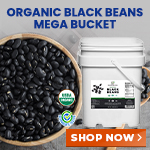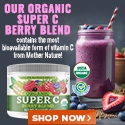
Natural Compounds in Vegetables plus Selenium Fight Melanoma
Tuesday, March 03, 2009 by: Sherry Baker, Health Sciences Editor
Tags: melanoma, health news, Natural News
- Newly released JFK files reveal Pentagon's role in creating Lyme disease and covid in the same lab
- Woman contracts WORLD'S DEADLIEST VIRUS after unknowingly being given the WRONG VACCINE
- Kiss Your Genetic Privacy Good-Bye! 23andMe Gets Green Light to Sell Your Intimate Genetic Details to Anyone They Want
- AI weather model outperforms traditional forecasts, boosts accuracy by 20%
- Revolutionize your diet with pomegranate: The miracle juice for gut health and metabolism
- Advisory: Ex-FBI agent exposes likely ATF honeypot operation selling illegal Glock switches
- The case for locking up the Deep State's biggest hatchet man...
- Analysis: The coming economic collapse, a mass uprising and Trump's three secret weapons to halt the growing revolt
- Sweden's migrant crisis deepens as failed green energy venture leaves thousands jobless, exposes systemic collapse
- At least 75 percent of Americans are unknowingly MEDICATED FOR STUPIDITY by fluoridated water – Utah now banning it
- U.K. unveils controversial pandemic preparedness tool: A double-edged sword?
- DHS Secretary Kristi Noem plans to dismantle FEMA
- Trump administration CUTS FUNDING to Gavi, the Vaccine Alliance - a major blow to the Bill Gates-backed entity
- Health Ranger Report: Ashton Forbes discusses TELEPORTATION ORBS and their role in MH370 disappearance
- Pediatric dentist exposes fluoride dangers as more states ban toxic water additive
- We are closer to all-out war in Europe, in Asia, and in the Middle East than most people realize
- Can special diets and supplements help kids with autism? A new research offers hope and hints at what works
- Gold reaches all-time high amid escalating trade tensions
- Newly released JFK files reveal Pentagon's role in creating Lyme disease and covid in the same lab
- Analysis: The coming economic collapse, a mass uprising and Trump's three secret weapons to halt the growing revolt
- Trump nominates VACCINE ZEALOT Susan Monarez to lead the CDC, sidelining RFK Jr.'s reform efforts
- Trump's greatest betrayal so far: Accelerating Middle East wars, silencing dissent, and serving Zionist masters
- CDC finally halts $11 billion COVID funding scam as health officials admit the ‘pandemic’ was a fraud
- The hidden dangers in your kitchen: How cooking methods impact diabetes, cancer and aging
- BEWARE: USDA allows genetically engineered vaccines to infiltrate organic food production
- Obama accused of laundering USAID funds to fuel global protest movements, regime change operations
- DEADLY DECEPTION: How COVID vaccines increased mortality rates and why authorities hid the truth
- Here are TEN all-natural ways to protect your garden without using harmful chemicals
- Dr. Mike Yeadon releases 15-minute testimony - WATCH - about genocidal intent of COVID “vaccines”
- Festive flavors: The sweet history, nutritional profile and health benefits of pecan pie
- Big Pharma's media takeover: How drug companies bought the news - and your health
- Dr. Suzanne Humphries makes bombshell appearance on Joe Rogan podcast, exposing vaccine industry deception back to POLIOMYELITIS
- Elon Musk: Aliens could be here on Earth RIGHT NOW
- 5 Simple steps to boost your brainpower: How to strengthen executive function in a distracted world
- Trump reverses course on Gaza plan, says “nobody is expelling Palestinians”
- California's social media censorship law struck down: A victory for free speech or a threat to online safety?
- Newly released JFK files reveal Pentagon's role in creating Lyme disease and covid in the same lab
- EPA advisor admits the agency is funneling billions to climate groups ahead of Trump’s return to White House
- California's social media censorship law struck down: A victory for free speech or a threat to online safety?
- Dr. Mike Yeadon releases 15-minute testimony - WATCH - about genocidal intent of COVID “vaccines”
- The Health Ranger releases “Vaccine Zombie” song and music video, using AI-animated zombies for the music video
- Florida takes a stand: DeSantis proposes permanent ban on mRNA vaccine mandates
- The pandemic as a tool for INDOCTRINATION: Understanding “The Indoctrinated Brain” by Dr. Michael Nehls
- “Why we influenced the 2020 elections”: Facebook files reveal the coordinated effort to bury the Hunter Biden laptop story
- Mike Adams releases country western hit single: Goin’ Back in Time is Comin’ Home
- Mike Adams releases music poetry sensation: A Child of God
- Unpacking the Lies That We’ve Been Fed – new song and music video released by Mike Adams, the Health Ranger
- Michigan sheriff announces criminal investigation into 2020 election crimes, Dominion Voting Systems
- Migrants are taking advantage of recent hurricanes to scam residents and loot their homes
- House Intelligence Committee calls for the ARREST and PROSECUTION of Dr. Anthony Fauci
- Rep. Nancy Mace introduces bill to ban biological males from female facilities on federal property
- Peter Rost exposes Big Pharma corruption in his book “The Whistleblower: Confessions of a Healthcare Hitman”
- Former horse rancher and 6,000 other plaintiffs are suing Syngenta after paraquat exposure led to Parkinson's Disease
- Mike Adams releases new song and music video: Nothing More Disgusting Than a Globalist
- Red Cross issues warning to stop blood plasma donations from vaccinated people
- Scientists confirm: GENIUS brain function can be spontaneously unleashed in humans without any apparent cause
- EPA advisor admits the agency is funneling billions to climate groups ahead of Trump’s return to White House
- HYSSOP: What research reveals about the health benefits of this ancient holy herb
- Two containers with completed ballots fall out of truck in Florida
- Fully vaccinated about to see “tsunami” of illness and death, warns virologist
- Global leaders unite to clamp down on “misinformation” with UN-backed Cascais Declaration
- BREAKING: 2025 NDAA authorizes mandatory military draft of WOMEN across America… as Pentagon pursues global NUCLEAR war with both Russia and China at the same time
- Michael Yon warns of a ZIONIST TAKEOVER in Trump’s second administration
- BOMBSHELL: DNA testing kits are a SCAM to develop ethnic-specific bioweapons
- Ozempic and Wegovy weight loss drugs are injectable LIZARD VENOM PEPTIDES that may unleash a devastating wave of organ failure… side effects align with symptoms of SNAKE BITES
- Israeli soldiers accused of even more torture and abuse in the West Bank
- These 13 countries just signed an agreement to engineer a global FAMINE by destroying food supply
- NASA admits that climate change occurs because of changes in Earth’s solar orbit, and NOT because of SUVs and fossil fuels
- RFK Jr. clears key hurdle: Sen. Susan Collins backs controversial HHS nominee, signaling a new era for health policy
- Sermon 30: How Jesus reveals Caesar’s FAKE CURRENCY and FALSE AUTHORITY
- Coriander seeds: Ancient medicine backed by modern science
- Arizona officials claim Maricopa County needs 10-13 days to tabulate results of the election
There are currently no drugs that can shut down the Akt3 protein which triggers the development of melanoma. However, Penn State College of Medicine scientists have discovered that a class of naturally occurring chemicals called isothiocyanates found in cruciferous vegetables (which include broccoli, cabbage, cauliflower, kale and Brussels spouts) appears to target this protein. And the Penn State researchers found they could make the isothiocyanates even more potent at lower doses by "rewiring" them with trace mineral selenium.
"Selenium deficiency is common in cancer patients, including those diagnosed with metastatic melanoma," explained lead researcher Gavin Robertson, associate professor of pharmacology, pathology and dermatology at Penn State, in a statement to the media. "Besides, selenium is known to destabilize Akt proteins in prostate cancer cells."
To study the effectiveness of the isothiocyanates-plus-selenium compound (dubbed isoselenocyanate) the scientists injected laboratory mice with 10 million cancer cells. After six days, the rodents developed large tumors. Then half were treated with the vegetable compounds and the others were treated with the same naturally occurring chemicals supplemented with selenium. When combined with selenium, the compounds resulted in a 60 percent reduction in the rate of growth of the cancerous tumors, compared to the vegetable-only compounds. The researchers also tested three different human melanoma cell lines with the two versions of the compounds and determined the selenium-enriched version was 30 to 70 percent effective in inhibiting the human cancer cells.
"We found that the selenium-enhanced compounds significantly reduced the production of Akt3 protein and shut down its signaling network," Robertson, who is associate director of translational research and leader of the experimental therapeutics program at Penn State Hershey Cancer Institute, said in the press statement. "We have harnessed something found in nature to target melanoma. And since we only need tiny amounts to kill the cancer cells, it means even less toxic side-effects for the patient."
The cancer fighting properties of cruciferous vegetables have been documented in many studies. In additional new research recently published in the journal Nutrition and Cancer, University of Milan scientists reported that eating broccoli appears to help protect smokers from lung cancer.
For more information:
http://live.psu.edu/story/37998
http://www.cancer.gov/cancertopics/types/mel...
http://lpi.oregonstate.edu/infocenter/foods/...
http://ods.od.nih.gov/factsheets/selenium.as...
https://www.naturalnews.com/025230.html
http://www.ncbi.nlm.nih.gov/pubmed/19235039?...
About the author
Sherry Baker is a widely published writer whose work has appeared in Newsweek, Health, the Atlanta Journal and Constitution, Yoga Journal, Optometry, Atlanta, Arthritis Today, Natural Healing Newsletter, OMNI, UCLA's "Healthy Years" newsletter, Mount Sinai School of Medicine's "Focus on Health Aging" newsletter, the Cleveland Clinic's "Men's Health Advisor" newsletter and many others.Melanoma at FETCH.news
Get independent news alerts on natural cures, food lab tests, cannabis medicine, science, robotics, drones, privacy and more.
Take Action: Support Natural News by linking to this article from your website
Permalink to this article:
Embed article link: (copy HTML code below):
Reprinting this article:
Non-commercial use OK, cite NaturalNews.com with clickable link.
Follow Natural News on Facebook, Twitter, Google Plus, and Pinterest
Science News & Studies
Medicine News and Information
Food News & Studies
Health News & Studies
Herbs News & Information
Pollution News & Studies
Cancer News & Studies
Climate News & Studies
Survival News & Information
Gear News & Information
News covering technology, stocks, hackers, and more



"Big Tech and mainstream media are constantly trying to silence the independent voices that dare to bring you the truth about toxic food ingredients, dangerous medications and the failed, fraudulent science of the profit-driven medical establishment.
Email is one of the best ways to make sure you stay informed, without the censorship of the tech giants (Google, Apple, Facebook, Twitter, YouTube, etc.). Stay informed and you'll even likely learn information that may help save your own life."
–The Health Ranger, Mike Adams












































